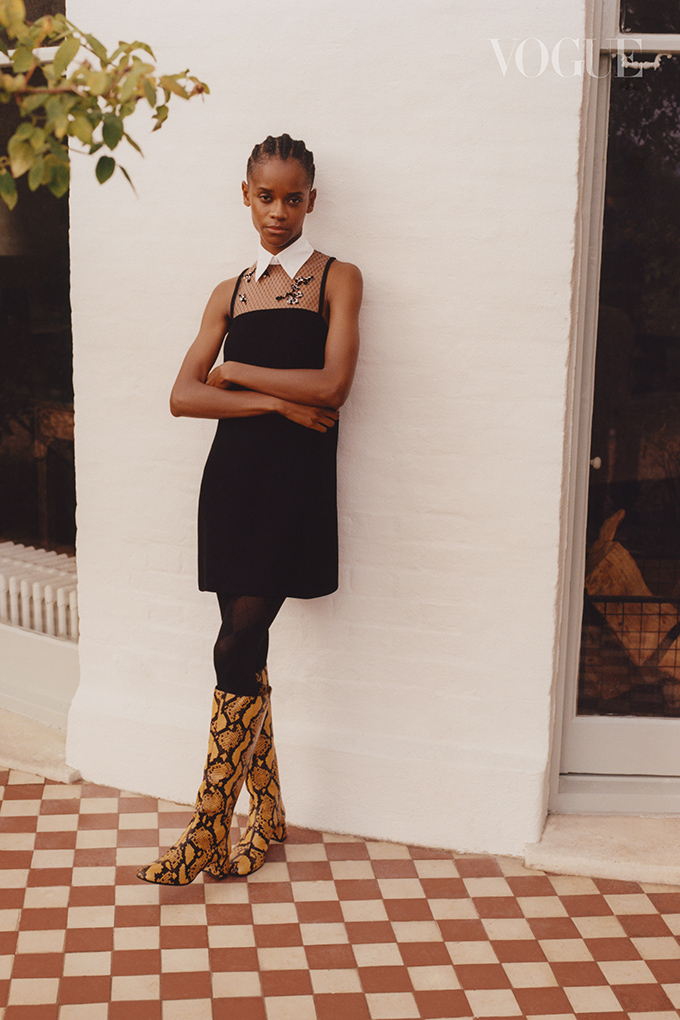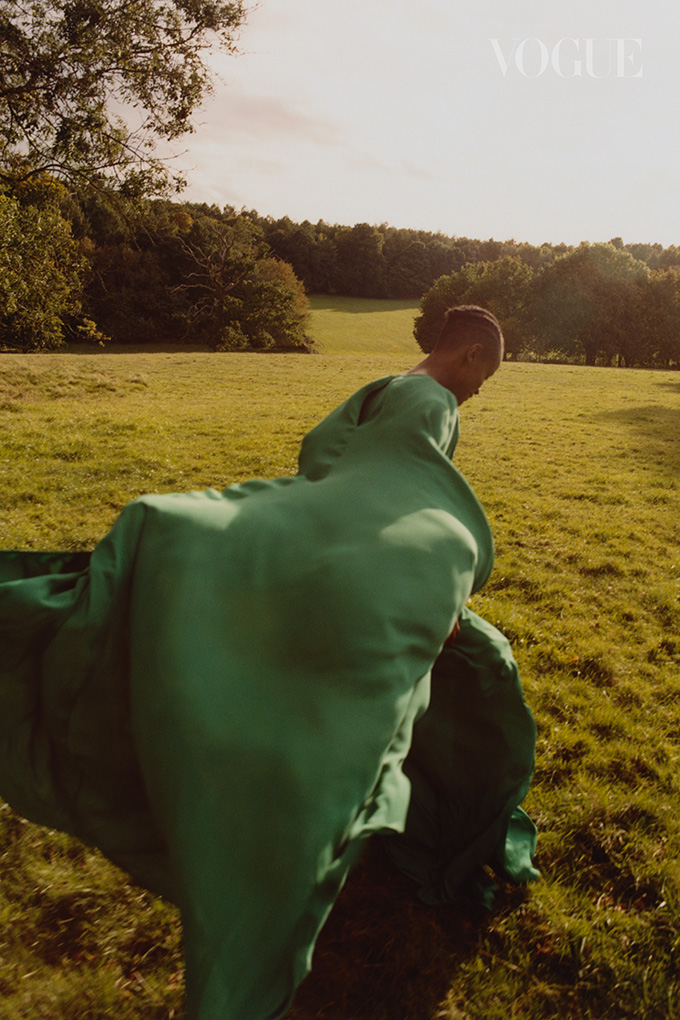Letitia Wright is still processing the magnitude of the last four years. As she dials in from Los Angeles early one Sunday morning, she is sprightly and warm despite a gruelling schedule. In the lead up to the long-awaited sequel to Marvel’s Black Panther, she shares what her last month has looked like: countless planes, a flurry of hotel rooms and quick meals. Her recount, however, ends with the word blessing.
At just 28 years old, the Guyanese-British starlet has proven herself to be a force to be reckoned with. Wright first graced screens through blockbuster titles like Avengers: Infinity War, Avengers: Endgame, Top Boy and Black Mirror, with the latter earning her an Emmy Award nomination. It was her character in Ryan Coogler’s Black Panther as the technology-loving princess of Wakanda in 2018, however, that catapulted her to colossal heights. Wright joined the ranks of a star-studded cast, from the late Chadwick Boseman and Lupita Nyong’o to Angela Bassett and Michael B Jordan.

“Playing Shuri has changed my life in many ways. She reaffirmed that this is the path for me and that all of the hard times—the failed auditions, crying in Starbucks after a messed-up casting—were worth it,” she shares. In 2019, Wright went on to clinch a Rising Star Award at the British Academy Film Awards and the Screen Actors Guild’s inaugural award for Outstanding Performance by a Cast in a Motion Picture.
Wright’s success hasn’t come without its pitfalls. In 2020, controversy around the actress’s anti-vaccination views resulted in her deactivating her social channels after a resounding backlash. In the same year, Boseman—lovingly referred to by Wright as her brother—passed away from colon cancer.

Today, Wright finds herself in a season of strength. She lights up as she talks about other projects in the pipeline: her upcoming role in the film The Silent Twins alongside actress Tamara Lawrance, her production venture 3.16 Productions and her foray into writing. For Wright, things have come full circle.
“Being in the UK, I had to adjust to what was available to me. My friends and I, we didn’t know how we were going to make this dream a reality. How were we going to be like Sidney Poitier and Viola Davis?” Wright shares as we touch on the beginnings of her journey. “It was an isolating experience because of the lack of knowledge that I was exposed to. I didn’t have anybody in the industry that I was connected to. So I educated myself. What does it mean to get an agent? What is a casting director? What is a headshot? I was able to break through by focusing on the industry that was available to me in London and unlocking the little keys. That led me to Hollywood.”
As the world laps up the preview of Black Panther: Wakanda Forever—the trailer garnered 172 million views in 24 hours—Wright stays anchored in her vision. From working through grief to being part of a history-making franchise, she opens up to Vogue Singapore about her journey to the biggest accolade of them all: standing in her identity.

You are part of a strength of actresses—like Michaela Coel and Lupita Nyong’o—who are embodying the real stories of Black women. How have you navigated this?
As a Black woman in this industry, I am incredibly proud of myself because the odds are stacked up against us simply because the scripts don’t exist. If I’m going to get the opportunity to hold a script in my hand, I want to be a vessel for impact. As long as it’s going to make someone feel something and be of purpose, then I can make a difference in the world. Slowly but surely, you start building this world of projects. That’s what turns impact to legacy. And I’m still building that world.
You’ve had a dynamic career but Black Panther took things to the next level. What was it like first auditioning for Shuri?
I was thinking about how enormous the role was. Here I am playing a princess and a scientist and the technological boss of the whole Wakandan Design Group. I was terrified. I remember creating a playlist on YouTube and watching videos of female scientists and African innovators whose voices weren’t being amplified. I felt that if I could tell the truth and use these videos as inspiration to represent these women, this could really impact someone. I’m thankful that it resonated and that I got through my initial fear.

What can you tell us about Shuri’s journey in Black Panther: Wakanda Forever?
There’s a shift in Shuri, a perspective on how to handle life. When we first meet Shuri, she’s really fun, fresh and vibrant and filled with so much joy. When we meet her in the sequel, there’s a broken-hearted woman in front of you. Through her journey, we explore what it means to overcome losing someone you love. So hopefully, when people watch it, they can relate in some way and it can help someone with whatever they’re dealing with. Whatever it is, whatever’s broken your heart, Shuri’s journey can make you unpack that for yourself. And I’m excited for people to see her maturity.
“As a Black woman in this industry, I am proud of myself because the odds are stacked up against us simply because the scripts don’t exist.”
You’ve described the movie as a love letter to your co-star and friend, Chadwick Boseman. How did you work through your grief while filming?
It was the most difficult thing I’ve had to do in my career because I couldn’t hide from it. I love acting because it helps me to hide sometimes. The reality of being on a set where you were admiring your brother a few years ago when he still had enough grace and energy and creativity to play with you was hard to face, especially when you go back to that set without him there. Ryan Coogler and I would look at each other knowing that we both wanted to start crying but we couldn’t. So we had to hold it together to tell the story and we found moments in the script where we could let loose. Ryan would say the name ‘Chad’ or play his voice and I would be finished. It was incredibly hard. I put my heart and my love for Chadwick in this movie. And I’m praying that people feel that.

Was there a memory of Chadwick that kept you going?
I drew on his words and things that we said to one another during moments that were very special. There’s a particular note he wrote to me that had this beautiful line: “Don’t change, don’t change who you are. You are perfectly imperfect and I’m proud of the woman that you are becoming.” When I’m on set and I have tough days and I don’t know if I can do it, I just remember what he wrote and I feel him encouraging me. That helped me through it a lot. And on top of that, Ryan and the support of the cast. Ryan and Angela were very close to me in terms of being able to help me do a lot. We helped each other, so that’s what kept us going.

You are refreshingly vocal about your mental health. How have you gotten through darker or difficult periods in your career?
I got through it by listening to the voice that was screaming at me: “You need to step out, you’re not okay. In order for you to continue, you need to check out.” I got to establish a relationship with God that is the foundation of keeping me peaceful. I got through those hard moments because I saw perspective in what matters, which is my mental health, my well-being, my family and the things that bring me joy.

What advice would you give to younger, aspiring actresses with regard to taking care of themselves?
Knowing your why and making sure that everything you do is in alignment with what’s truly important to you. Does taking a walk and spending time with your family make you fulfilled? If so, make sure after work, when you’ve given yourself to your craft, to take time to do that for yourself.
You’ve recently started your own production house, 3.16 productions. What was the inspiration behind this and how do you choose what you want to work on?
The inspiration was based on my desire to contribute. I want to contribute positively to what’s already out there. I try to find things that I would want to see or I feel that would be beneficial for us as a community and society to break down and understand. For example, when I wrote Things I Never Told My Father, it was based on me watching my friend go through the grief of his uncle for two to three years. I think about how things might move people into action and then my mind starts to explore and I just start writing.
“I put my heart and my love for Chadwick in this movie. And I’m praying that people feel that.”
You’ve also been experimenting with your style lately. How would you describe it?
I’ve got an androgynous type of flow going on. My style fluctuates. Some days I want to wear a beautiful dress and other days I want to wear a dope suit with patterns. I’m still discovering it but it’s definitely a flow between masculinity and femininity. I think how I dress is connected to my personality, too. I’m very tomboyish yet incredibly girly. If I see a cute guy I’ll think ‘oh my god’ and then the next day I’m in jeans and chucks just vibing.
And finally, the theme of this issue is ‘Glory’. What does ‘Glory’ mean to you?
When I think about glory, I think about the heavenly realm, something that’s other-worldly. It’s not as complicated as it may sound when I’m describing it. I think about it as your talent, who you are at your highest form. It’s you becoming who you are meant to be. I think about reaching your highest potential and your highest self. That’s beautiful. That’s magnificent. Just who you are on the inside in the purest, most beautiful way of being. That’s glory, man.
Photography Ben Parks
Styling Fabio Immediato
Hair Neil Moodie
Make-up Wendy Rowe/The Wall Group
Manicure Sabrina Gayle/The Wall Group
Set designer Tobias Blackmore
Florist Lucy Jonesy Flowers
Post-production Slick Studios
Producer The Curated
Pre-order your copy of the November ‘Glory’ issue of Vogue Singapore online now or pick it up on newsstands from 21 November 2022.





